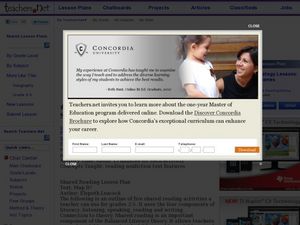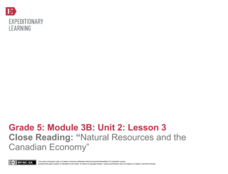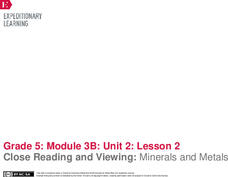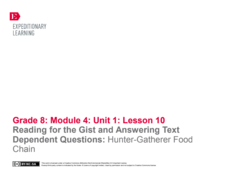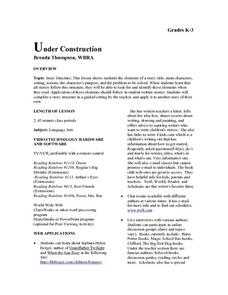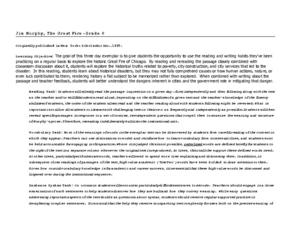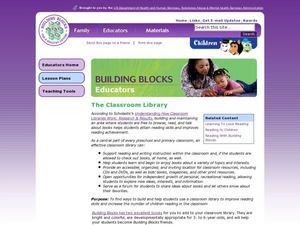Curated OER
Using Social Studies in Five Shared Reading Lessons: Geography
After several short 15-minute mini-lessons, your learners will gain an understanding of the characteristics of a non-fiction text. Using the book Map It by Elspeth Leacock, your class will become acquainted with non-fiction terms such as...
Achieve3000
Oral Reading Fluency
Accuracy, phrasing, flow, and pace, the four traits of of oral reading fluency, are the focus of a series of exercises that are designed to help readers develop these comprehension and literacy skills.
EngageNY
Reading for Gist, Answering Text-Dependent Questions, and Determining Author’s Purpose: Industrial Food Chain
A Reading Closely: Guiding Questions handout leads readers to discover the gist of The Omnivore’s Dilemma. While reading, pupils look closely at the words in the text and discuss their meaning. They use dictionaries when needed to answer...
EngageNY
Reading for Gist: “Middle Ages” Excerpt 2
Read and repeat. Scholars repeat the strategies for digging deeper into text from instructional activity two. This time they focus on Middle Ages Excerpt 2. Learners write unfamiliar words in the word catcher and use details from the...
EngageNY
Close Reading and Gathering Evidence from Frightful’s Mountain and “Welcome Back”
Where did the falcons go? Scholars read the article Welcome Back which describes the disappearance of falcons due to the use of pesticides. During a second read, learners annotate the text by marking unfamiliar words and facts about...
EngageNY
Close Reading: “Natural Resources and the Canadian Economy”
Readers continue to learn how natural resources are important to Canada's economy. They read, annotate, and answer text-dependent questions about Natural Resources and the Canadian Economy. They then discuss key terms in the text.
EngageNY
Close Reading and Viewing: Minerals and Metals
How easy is it to live off the land? Scholars read Minerals and Metals in Your Life and discuss how Canada's natural resources meet the needs of the people. Pupils watch a brief video and discuss the gist of the text and video. They then...
EngageNY
Close Reading: The Montgomery Bus Boycott Speech
How did Martin Luther King, Jr. sway people with his speeches? Scholars carry out a close reading of the Montgomery Bus Boycott speech and use the Close Reading Guide to help them work through the powerful text. While reading, they...
EngageNY
Reading for Gist, Answering Text-Dependent Questions, and Determining Author’s Purpose: Industrial Organic Food Chain
After re-reading The Omnivore’s Dilemma using a Reading Closely: Guiding Questions handout, class members use sticky notes to annotate and determine the gist of the text. Finally, they use an Author’s Purpose graphic organizer to...
EngageNY
Reading for Gist and Answering Text-Dependent Questions: Local Sustainable Food Chain
Readers use sticky notes and a Reading Closely: Guiding Questions handout to record the gist of a different section (pages 161-166) in The Omnivore’s Dilemma. They then pair up and share their ideas. To end the lesson, readers complete...
EngageNY
Close Reading: Excerpt 2 of “The Digital Revolution and the Adolescent Brain Evolution”
Help scholars comprehend a challenging text. Using the resource, pupils read excerpts from an article about the digital revolution and adolescent brain development. As they read, they answer text-dependent questions and complete a close...
EngageNY
Reading for the Gist and Answering Text Dependent Questions: Hunter-Gatherer Food Chain
Readers use sticky notes and a close reading guide to identify the gist of "My Pig" on pages 240–245 of The Omnivore's Dilemma. After reviewing their thoughts with peers, they answer text-dependent questions about the section.
EngageNY
Close Reading: Excerpt 5 of “The Digital Revolution and the Adolescent Brain Evolution”
Class members consider how technology affects social interactions as they continue reading an article about the digital revolution and adolescent brain development. Then, working in pairs, scholars answer text-dependent questions and...
EngageNY
Close Reading: Fishbowl Comparing Atticus and Mr. Gilmer (Chapters 17-19)
Class members participate in two circle group discussions to compare Atticus and Mr. Gilmer in chapters 17-19 of To Kill a Mockingbird. They use a note-catcher to guide their thinking. For homework, readers begin looking at chapters 20-21.
Curated OER
The Important Thing About Reading
Third through fifth graders discover the importance of reading and plan a service project to provide books to children. First, they read the book The Important Book and then they brainstorm about the importance of reading. Afterward,...
Student Achievement Partners
"The Glorious Whitewasher" from The Adventures of Tom Sawyer by Mark Twain with Mini-Assessment
It's the classic scene: Tom Sawyer is whitewashing a fence. Expose your learners to Mark Twain's humor while reinforcing reading comprehension. Eighth graders are encouraged to read and reread, achieving as much exposure to the text as...
Curated OER
Under Construction
Young readers examine the elements of story structure that are included in all stories. They include these elements in their own written pieces. This phenomenally-designed plan has everything you need to easily implement it in your...
Curated OER
Jim Murphy, The Great Fire - Grade 6
The Great Fire by Jim Murphy provides the text for a study of the Chicago fire of 1871. The plan is designed as a close reading activity so that all learners have the same background information require for writing. Richly detailed, the...
Curated OER
Frederick Douglass, Narrative of the Life of Frederick Douglass an American Slave, Written by Himself
Foster reader confidence when encountering complex text and reinforce the skills readers have acquired to build and extend their understanding of text. The plan uses a section of Douglass’ narrative as an exemplar text. Directions for...
Curated OER
Using a Title to Determine the Main Idea
Use the title of a book to determine the main idea. Readers will view the cover of The Wedding and predict what the story will be about. Graphic organizers help chart important information and build new vocabulary. Other stories are used...
Curated OER
The Secret to Freedom Teacher’s Guide
Students read the story "The Secret to Freedom" and participate in active reading to personalize what they have read. In this reading lesson, students follow several writing activities and discuss their work . Students integrate their...
Curated OER
The Classroom Library
Youngsters visit the classroom library to complete various reading activities, pushing their motivation to read! They will discuss different library books and read two specific books that use "Building Block" reading skills. They also...
Museum of Disability
The Right Dog for the Job
Here, dog lovers can enjoy an educational lesson about the ways puppies are trained to become service and guide dogs. Based on The Right Dog for the Job by Dorothy Hinshaw Patent, the lesson provides discussion questions for learners...
Curated OER
What Kind of Ladybug Are You?
As a class, read different sentences prepared by the teacher, identifying the punctuation that is needed for the appropriate expression. In small groups, have each child assume the role of one or more character in The Grouchy Ladybug by...
Other popular searches
- Guided Reading Comprehension
- Flat Stanley Guided Reading
- Guided Reading Lesson Plans
- Guided Reading Lessons
- Guided Reading Activities
- Guided Reading Fluency
- Dinosaur Guided Reading
- Guided Reading Elementary
- Guided Reading Lessons Plans
- Reading Comprehension Guided
- Guided Reading Cam Jansen
- Guided Reading Prediction


